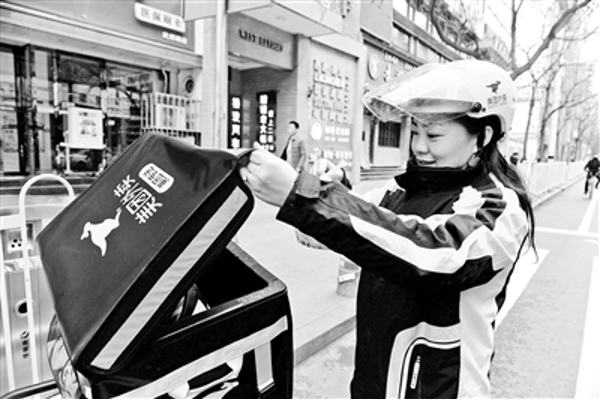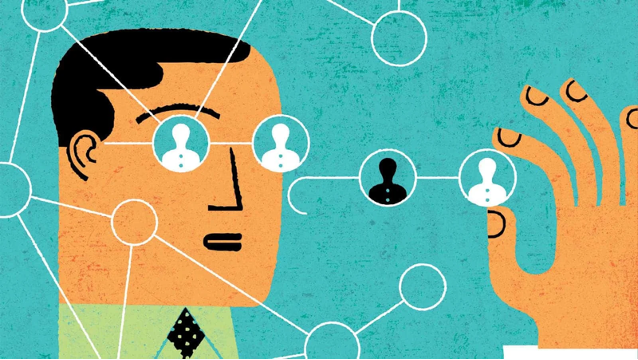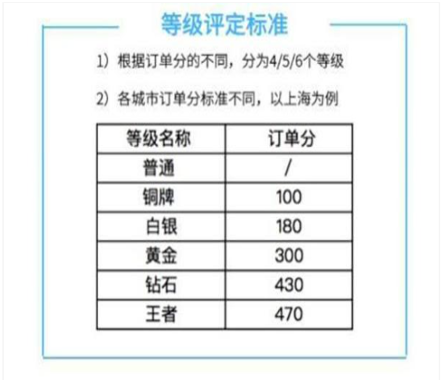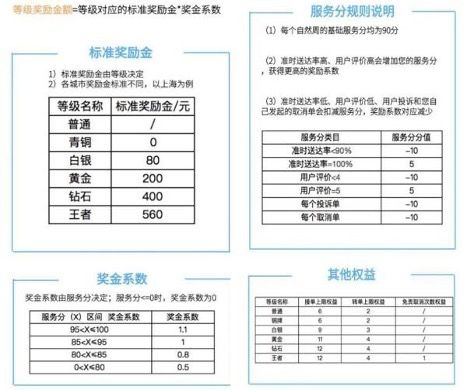
诞生于这个大时代,反对一切压迫和宰制的青年平台。关注思想交锋、社会运动,关心工人、农民、女性、全球南方等被损害者的真实处境,也通过写作和实践去想象、去创造别样的社会。网站:masseshere.com
Is the delivery fee of 3 yuan 4 low? In the end, there is still an obedient female rider to take the order

Text|Ding Mei who delivers food
"Takeaway is manual work. Can you do it as a woman?"
"So you're a woman, no wonder the delivery was so slow."
"A woman can't handle such a heavy meal, so let's get someone else!"
In this case, Li Hua (pseudonym), a female rider, has heard it many times. I remember that during a meal delivery last year, in order to deliver it faster, she went the wrong way on the street of Balizhuang. At the beginning, he ran slowly, and was caught up by the male rider next to him. He joked, "You women still want to compete with our men, but you can't keep up with us after two runs." Li Hua was very unwilling and had to speed up desperately. , but collided with a person who was riding a bicycle normally. Her feet were scratched by the pedals of the bicycle, but she could only move forward with pain. Otherwise, the order will be timed out.
"Women are weak, but mothers are strong. Your body is really beautiful when you bring your baby to take out food."
"Her battery car has a baby seat fixed on it, and a small baby is sitting on the seat, and her head is stuck out curiously. She is carefully checking the order information of the food delivery on her mobile phone... This can only be done with one hand. Holding the child, I was carrying a takeaway to deliver the meal... I hope she won't be blamed for being slow when she goes upstairs."
"It has been difficult to find a job in the past two years, but this cannot be a reason for us to let ourselves go. We are born as human beings. When we see that this young mother will resolutely assume the responsibility of a mother even if she delivers food, what reason do we have not to work hard? Woolen cloth?"
The images of young mothers flying across the road with their babies to deliver meals began to materialize and were delivered to the public one after another: In June this year, a 4-month-old baby in Zhengzhou City, Henan Province was carried in her arms, followed by My mother delivered takeaways for two months. Coincidentally, female riders in Chongqing were also caught sitting on the street during a break during the meal delivery, breastfeeding a baby who had been in her arms for several months. Receive orders on the APP, deliver meals...

In 2020, the Beijing News released the "Investigation Report on the Occupational Sustainability of Food Delivery Riders". The data showed that 13% of the survey samples were female riders. In the same year, Ali Local Life Service Company released the "2020 Ele.me Blue Knight Research Report" It is pointed out that among the Ele.me riders who deliver meals to Jinan citizens, the proportion of female riders is 14%, ranking second in the list of municipalities and provincial capitals nationwide. Although the proportion of female riders is growing, delivery is still a male-dominated industry characterized by heavy physical strength, long labor and speed, and female riders participate as a "professional gender minority". It is undeniable that the emergence of female riders is the experience of "occupational gender minorities" breaking through gender segregation in specific labor situations, but rather than discussing it as an active attempt by women to break through occupational gender segregation, it is more likely that in the platform economy Under the new employment model, the de-escalation of female employment and the exercise and maintenance of traditional gender division of labor.
When the false veil of the so-called "platform fairness" and "algorithmic neutrality" is lifted, we can clearly see how it eats the dividends of women as family caregivers, and how to make them into Cheap and easy labor.
The platform is unfair, capitalists are not philanthropists
The turnover rate of the food delivery industry has always been at a high level, and frequent job-hopping is the new normal under the employment model of the platform economy. In addition to the strict control over the labor process of workers, which makes them lose control of the labor process, the lack of opportunities for advancement, labor security, and protection from discrimination is also eroding workers' rights and rights. If this normalization of the “disempowerment” of workers is a social structural issue, it is also an issue intertwined with gender-cultural programming when it happens to female riders.
On the bright side, the platform does not set any entry threshold, and even continuously uses "low threshold" as its selling point to attract the entry of low-skilled labor. But we can still see that the entire food delivery industry is built according to the male body and spirit: high speed and strong physical strength are required. We admit that for the same abstract type of work—delivery food, there is almost no difference in labor between female riders and male riders, and it is mainly labor. In the face of the continuous decline in the unit price of freight, the labor hours of the riders are getting longer and longer, and the labor intensity is getting higher and higher. But when female riders enter the food delivery industry, they can only eliminate the culture based on gender stereotypes (such as “food delivery is manual labor, can you do it as a woman?”) Sexual segregation, thereby establishing the legitimacy of female labor in this male-dominated industry . Female rider A Xia, after becoming a rider, has replaced three battery cars. The rearview mirror of the battery car that was delivering meals was also damaged due to a speeding collision. "None of the riders look at the traffic lights. Often, you have to start the lights before they jump." In addition to riding on the road rain or shine, the rider's daily life is to run between shopping malls, office buildings and residential buildings. In order to meet the platform's pursuit of speed, female riders "actively" transform their female body characteristics, as A Xia said:
"Usually I never bring water, I waste time going to the toilet, and I rarely drink water. If I have a period, it will be even more troublesome. Every time I have a bad first day of my period, but I still have to run, you have to endure the pain, you Can't rest."
This limitation based on gender differences is interpreted by female riders as gender differences that individuals need to address and overcome . For them, the slogan "Platforms are fair" is being internalized:
"The food delivery industry is fair to both men and women. You won't earn more just because you're a man, and you won't be discriminated against just because you're a woman. As long as you are willing to endure hardship and work hard, your salary will be very impressive."
However, the so-called gender-neutral treatment of the platform, in the actual operation process, is to evade the responsibilities of female workers that should be assumed as an employer. In addition to women's active body modification to meet the platform's requirements, the cost of childbirth that was originally calculated and borne by the company has also been eliminated by the platform. When establishing labor relations with workers, profit-oriented companies have to go to great lengths to avoid the labor costs that may increase in marriage and childbirth for female workers (such as gender discrimination in the recruitment process and illegal termination of contracts, etc.); In the platform economy of labor relations, when there is no labor contract to clarify the affiliation of employees to the enterprise, the enterprise does not need to provide any guarantee for its employees, and there is no problem of traditional enterprises avoiding risks. ” and “irresponsible” behavior. The emergence of the scene of "mother taking the baby to deliver food" is the best illustration of the continuation of the punishment of motherhood in the platform economy.
However, when the identity of “mother”, which emphasizes the responsibility of reproduction, is magnified to extol the greatness of maternal love or embellish it as a personal issue, their identity as laborers, together with the fact that their labor relationship with the platform is not recognized, is the cause of their carrying. The fact that the reason for the baby to deliver food is also glossed over. Otherwise, according to Articles 5 and 9 of my country's "Special Provisions on Labor Protection for Female Employees" and Article 62 of the "Labor Law", these mothers who bring their babies to take out food will never appear, because female employees are pregnant, giving birth and Breastfeeding period is protected by law. Except for maternity leave of not less than 90 days, the salary shall not be reduced, dismissed, labor or employment contract shall not be terminated; breastfeeding time and time spent on breastfeeding and round trips in the unit are counted as labor. time.
As the rights and interests of workers that should be protected, it is eliminated in the praise of "mother's love" and the excellent personal virtues of "as long as you are willing to endure hardships", and it is also eliminated in the process of the platform actively resisting the determination of labor relations with the riders. Platform capitalists, on the contrary, have the reputation of "philanthropists" who can provide a certain objective income for women who need to take care of their families. If it is said that "freedom" is a false promise made by platform capital to platform labor, then helping to promote gender equality in the labor force and weakening the punishment of motherhood is the biggest lie it has said. When we are discussing how the algorithm makes the full-time food delivery riders become the tool people of the system, more and more male riders are unable to bear the burden of the long labor time and the continuously compressed unit price, and are frequently entering and leaving the food delivery industry. Being able to take care of the family”, a beautiful picture created by the platform, attracts the entry of female takeaway riders and becomes their supplementary cheap labor, maintaining the operation of the platform system.

Algorithms are not neutral, making women second-class cheap labor
The root cause of gender differences in the platform economy is usually not that platform designers intentionally exclude women, but that the use of algorithms itself is based on the existing gender labor division model. , run longer, earn more" algorithm and reward and punishment plan, causing "institutional exclusion" for female riders who need to take care of their families . Research by Zheng Guanghuai's team pointed out that the platform has set up a strict promotion system for workers. Taking a crowdsourcing as an example, the platform will convert the calculation of orders completed by riders into order points every week. Different order points correspond to different levels, such as ordinary, bronze, silver, gold, diamond and king. Riders are only eligible for promotion to the next level after meeting specific workload requirements. The higher the rank of the rider, the better the salary incentives and rights he/she gets, such as bonuses and transfer rights. At the same time, in order to encourage riders to cover their meal delivery time to breakfast and supper time, the platform will add an additional 0.5 points to valid orders completed during breakfast and supper time. Stimulated by the decreasing unit price and the algorithm-based reward program, riders spend more and more time running orders online, and the distance of running orders is also getting farther and farther: in terms of delivery time, more than half of takeaway riders have to spend more time every day. In terms of delivery distance, more than half of the delivery riders have a daily delivery distance of more than 80 kilometers. In this "full-time" running single state, more than 60% of the riders' monthly income is maintained between 4,000 yuan and 8,000 yuan.


Although the current labor and living conditions of female riders are not abundantly presented to the public, we can still get a glimpse of it from some media reports. The reason why most female riders choose to jump from the family system to the takeaway system is the fact that they can not only fill the financial gap of the family, but also handle the affairs of the family caregiver at the same time. Of course, under the influence of the epidemic, unemployment or declining wages have also pushed women into the industry of takeaway riders. For example, Li Hua, who has just been a food delivery rider for six months in the report, was dismissed as a catering waiter due to the bleak business in the catering industry under the epidemic, and then switched to become a food delivery driver. For her, as a mother of two school-aged children, takeaway riders have relatively decent income, free time, and can take care of the family, which is her greatest feeling about this job, "I can send my children to school in the morning, and I will be fine in the afternoon. You can go outside to earn some extra money. And usually the delivery distance is not far, just within a range of about 5km around, if you encounter any emergency, you can go home in time to deal with it.”
Due to the traditional gender division of labor, even female riders’ wages form part of the entire family’s income, but the internalized role division of “caring for the family” makes her still put “family” first. Platform work, such as delivering food, has become a secondary auxiliary job for her to help make up for her family. Under the market economy, the productive labor and reproductive labor that women engage in are in conflict. This is a battle for women's 24-hour time and labor force. Female riders simply cannot increase their income by extending the continuous delivery time and delivery distance on the job like most male riders. Fragmented schedules allow female riders who are burdened with family care responsibilities to "run one order is one order" and silently accept low-cost running orders. The delivery time that the platform is willing to give higher income or higher rights, such as breakfast and supper time, is often highly overlapped with the reproduction time period when female riders need to do housework, so they cannot increase their income through reward programs. In this way, under the time competition between productive labor and reproductive labor, female riders naturally run far from fast enough, run long enough, and earn enough.
platform, but can profit from it. Due to the "intermittent, random and subsidiary" labor attributes of self-positioning, female riders internalize and abide by the rules of the game that they become second-class cheap labor, accepting low unit prices, low income and no labor rights. Guarantee the labor conditions of running orders, and transform itself into an endless supply of labor that can be misappropriated by platform capital. The platform glorifies its own exploitation as a "gift" to female riders with family care responsibilities, "both earning money and taking care of their families." In fact, the capital of food delivery platforms not only strengthens the economic status of women, but also strengthens the social culture of traditional gender division of labor.
When we are talking about algorithms that bind riders, in female riders, especially those with family responsibilities, family has also evolved into a means used by platform capital to control female riders, making them more submissive and obedient. In the face of low-priced running orders, when male riders frequently jumped in and out and refused to accept orders to resist the interruption of takeaway delivery, the appearance of female riders became another source of cheap labor for the platform. Further, they are used by platform capitalists to become a reserve army to divide workers and provoke competition among workers, so as to continuously lower unit prices. Otherwise, Meituan Wang Xing would not have said boldly, "Is the price of 3.4 yuan very low? In the end, a rider will still take it."

References
The Beijing News, 2020, Survey Report on Occupational Sustainability of Food Delivery Riders
Like my work?
Don't forget to support or like, so I know you are with me..

多数派正在派送中

诞生于这个大时代,反对一切压迫和宰制的青年平台。关注思想交锋、社会运动,关心工人、农民、女性、全球南方等被损害者的真实处境。
Comment…